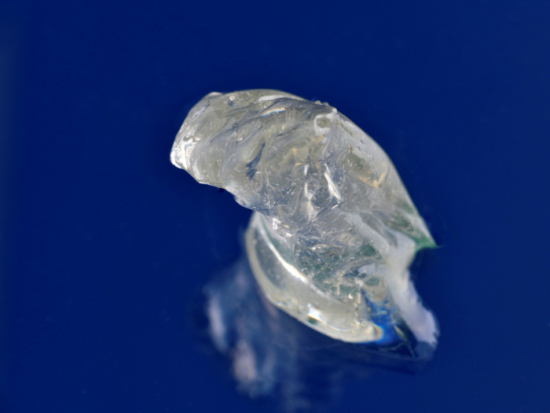Biomass-based butadiene a world first – Yokohama Rubber
 A significant blob – Yokohama Rubber claims a world first with its biomass-based butadiene (Photo: Yokohama Rubber)
A significant blob – Yokohama Rubber claims a world first with its biomass-based butadiene (Photo: Yokohama Rubber)
The Yokohama Rubber Co., Ltd. has announced a global first, the development of a technology for efficiently producing butadiene from a biomass. It achieved this breakthrough via the ‘Bio-monomer Production Laboratory’, which the company established jointly with Riken and Zeon Corporation.
Butadiene is a core raw material used to make synthetic rubber used in tyres and other products. Currently, industrial butadiene is produced as a by-product of naphtha pyrolysis. As such, the development of an independent butadiene production technology will help reduce dependence on petroleum and lower carbon dioxide emissions.
The joint research team has succeeded in creating cells with excellent butadiene-producing ability using new artificial pathways and enzymes. This makes it possible to go through cheaper intermediates than conventional metabolic pathways, and by incorporating the knowledge of the enzymes that have been developed thus far, the cost of butadiene fermentative production will be significantly reduced.
Co-operation since 2013
The team’s research results are being published today in Nature Communications, a London-based online journal that publishes research from all areas of the natural sciences. The team also has succeeded in producing polybutadiene rubber from the butadiene produced by the world‘s first fermentation production using this new technology.
Previously, in 2018 the Bio-monomer Production Laboratory achieved another world first when it succeeded in using a new artificial pathway and highly active enzymes to create cells with excellent isoprene-synthesising capability. The technology achieves an integrated process that uses a biomass (sugar) generated in the cells to trigger the production of the isoprene.
Yokohama Rubber, Riken Center for Sustainable Resource Science (CSRS) and Zeon have been cooperating in joint research projects since 2013. The Bio-monomer Production Laboratory was established inside Riken in April 2020, and under Riken‘s ‘Integrated Collaborative Research Program with Industry’ it has been accelerating research that will achieve deliverables needed by society. Going forward, the team will conduct research to establish more highly productive enzymes and an efficient purification technology by organically fusing the know-how and technologies of Yokohama Rubber, Riken and Zeon.
Riken is Japan’s only comprehensive research institution for the natural sciences. Riken CSRS is dedicated to the realization of a sustainable society through its research in the field of biological functions, especially its basic research on the effective use of plant-microorganism bioprocesses. Zeon, a leading manufacturer of synthetic rubbers, places its research emphasis on polymerization catalyst technology and enhancing the performance of synthetic rubbers. Yokohama Rubber, as a manufacturer of tyre and rubber products, is engaged in research on utilizing carbon-neutral biomass derived from plants. The company states that it will continue to promote the development of innovative technologies that will help achieve the United Nations’ Sustainable Development Goals (SDGs).





Comments